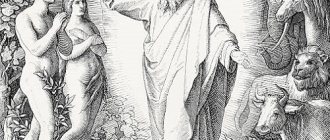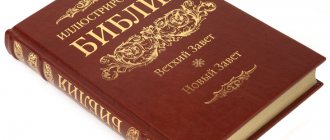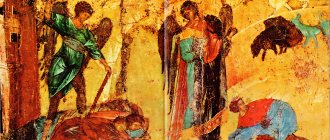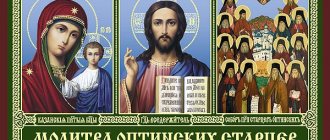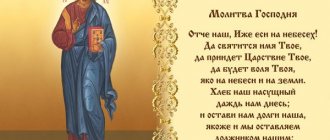Genesis (Old Testament), summary
“Genesis” is a book that tells about the creation of the world, the fall of man, the history of antediluvian civilization, the history of the flood. About halfway through the book, the story switches to the story of one family: Abraham's family. It was the descendants of Abraham who became the ancestors of the entire Jewish people. It was this small people who maintained faith in the true God for centuries, so special attention is paid to their history. The twelve sons of Jacob, Joseph, and the coming of the Hebrews to Egypt are the highlights of the final chapters of Genesis.
Table of contents
Old Testament (Tanakh and non-canonical books)Pentateuch of Moses | ||
| Life | The first book of Moses. Being | Torah*: Be-reshit |
| Ref. | The second book of Moses. Exodus | Torah: Shemot |
| a lion | The third book of Moses. Leviticus | Torah: Va-yikra |
| Number | The fourth book of Moses. Numbers | Torah: Be-midbar |
| Deut. | The fifth book of Moses. Deuteronomy | Torah: Devarim |
History books | ||
| Nav | Book of Joshua | Prophets (Nevi'im): Yeh hoshua |
| Court | Book of Judges of Israel | Prophets: Shoftim |
| Ruth | Book of Ruth | Scriptures: Ruth |
| 1 Kings / I Himself | First Book of Samuel | Prophets: Shmuel I, i.e. Samuel I |
| 2 Kings / II Himself | Second Book of Samuel | Prophets: Shmuel II, i.e. Samuel II |
| 3 Kings / I Kings | 3rd Kings | Prophets: Melachim I, i.e. Kings I |
| 2 Kings / II Kings | Fourth Book of Kings | Prophets: Melachim II, i.e. Kings II |
| 1 Par / I Chr | First Book of Chronicles | Scriptures (Ketuvim): Divrei h ha-yamim I, i.e. Chronicles I |
| 2 Par / II Chr | Second Book of Chronicles | Scriptures: Divrei h ha-yamim II, i.e. Chronicles II |
| Ezr/Ezr | Book of Ezra | Scriptures: Ezra |
| Nehem/Neh | Book of Nehemiah | Scriptures: Nehemiah |
| Esf | Book of Esther | Scriptures: Esther |
Teaching books | ||
| Job | Book of Job | Scriptures: Job |
| Ps | Psalter | Scriptures: Te h ilim, i.e. Psalms |
| Proverbs | Proverbs of Solomon | Scriptures: Mishlei |
| Eccles | Book of Ecclesiastes, or Preacher | Scriptures: Ko h elet |
| Song | Song of Solomon | Scripture: Shir Hashirim |
Prophetic books | ||
| Is | Book of the prophet Isaiah | Prophets: Yeshaya h y |
| Jer | Book of the Prophet Jeremiah | Prophets: Irmeya h y |
| Cry | Lamentations | Scriptures: Eicha |
| Iez | Book of the Prophet Ezekiel | Prophets: Yehezkel |
| Dan | Book of the Prophet Daniel | Scriptures: Daniel |
| OS | Book of the Prophet Hosea | Prophets : Hoshia |
| Joel | Book of the Prophet Joel | Prophets: Yoel |
| Am | Book of the Prophet Amos | Prophets: Amos |
| Avd | Book of the Prophet Obadiah | Prophets: Ovadiah |
| And she | Book of the Prophet Jonah | Prophets: Jonah |
| Mich | Book of the Prophet Micah | Prophets: Micah |
| Nahum | Book of the Prophet Nahum | Prophets: Nachum |
| Avv | Book of the Prophet Habakkuk | Prophets: Havakkuk |
| Soph | Book of the Prophet Zephaniah | Prophets: Zephaniah |
| Agg | Book of the Prophet Haggai | Prophets: Haggai |
| Zach | Book of the Prophet Zechariah | Prophets: Zechariah |
| Small | Book of the prophet Malachi | Prophets: Malachi |
Non-canonical books | ||
| 2 Rides | Second Book of Ezra | |
| Tov | Book of Tobit | |
| Judith | Book of Judith | |
| Prem | Book of Wisdom of Solomon | |
| Sire | Book of Wisdom of Jesus, son of Sirach | |
| Ambassador Jer | The Message of Jeremiah | |
| Var | Book of the Prophet Baruch | |
| 1 Macc | First Book of Maccabees | |
| 2 Macc | Second Book of Maccabees | |
| 3 Macc | Third Book of Maccabees | |
| 3 Rides | Third Book of Ezra | |
New Testament | ||
| Mf | Gospel of Matthew | |
| Mk | Gospel of Mark | |
| OK | Gospel of Luke | |
| In | Gospel of John | |
| Dejan | Acts of the Apostles | |
Council messages | ||
| Jacob | Epistle of James | |
| 1 Pet | First Epistle of Peter | |
| 2 Pet | Second Epistle of Peter | |
| 1 In | First Epistle of John | |
| 2 In | Second Epistle of John | |
| 3 In | Third Epistle of John | |
| Jude | Epistle of Jude | |
Epistles of the Apostle Paul | ||
| Rome | Paul's Epistle to the Romans | |
| 1 Cor. | Paul's First Epistle to the Corinthians | |
| 2 Cor. | Paul's Second Epistle to the Corinthians | |
| Gal | Paul's Epistle to the Galatians | |
| Eph | Paul's Epistle to the Ephesians | |
| Phil | Paul's Epistle to the Philippians | |
| Number | Paul's Epistle to the Colossians | |
| 1 Fes | Paul's First Letter to the Thessalonians | |
| 2 Fes | Paul's Second Epistle to the Thessalonians | |
| 1 Tim | Paul's First Epistle to Timothy | |
| 2 Tim | Paul's Second Epistle to Timothy | |
| Titus | Epistle to Titus Paul | |
| Flm | Epistle to Philemon by Paul | |
| EUR | Paul's Epistle to the Hebrews | |
Apocalypse | ||
| Open | Revelation of John the Evangelist |
Exodus (Old Testament), summary
The book of Exodus is the second book of the Old Testament. It was written by Moses, like Genesis, and begins the story from the moment when the life of the descendants of Jacob in Egypt became unbearable.
“Exodus” is the story of the flight of the chosen people from Egypt and their search for their land. In the desert, Moses will be given the commandments, the same ten commandments that children still learn in Sunday schools. The stories about the parting of the sea, the manna coming down from heaven, and the golden calf are all from the book of Exodus.
There are 39 books in the Old Testament, and they are all very different. Not all of them are historical or legal, like Genesis or Exodus. There are also poetic works, for example, “Ecclesiastes,” and there are prophetic works, for example, “The Book of the Prophet Isaiah.”
Perhaps the most famous and frequently used book is the Psalter (Old Testament). It is difficult to convey a brief summary of this book, since it all consists of poems. These poems were, of course, not written in Russian, so the rhymes and meter were lost in translation. But all the same, poetic images, a repentant or joyful mood, reasoning about the will of God remained.
In general, the Old Testament is the book of the Jewish people. Christians consider them prophetic; they find in the text many indications that Christ is the Messiah. For them, the essence of the Old Testament is to bring the Jewish people to Christ, to accept Him as Savior. Modern Jews do not agree with this at all. For Jews, the composition and text of these books differs somewhat from the Christian version.
Why do many of the Old Testament requirements seem so harsh?
Evaluating some Old Testament (legalized) norms of behavior, as well as some actions of people of the pre-Christian era, committed at the special request of God, many contemporaries regard them as unjustifiably cruel. This often causes reproaches against Christians from heterodox or atheists, saying, look what a cruel “god” you believe in. In reality, God is not the author of unjustified, excessive cruelty. He is a Lover of Humanity. When making such assessments of the Old Testament, its accusers, as a rule, do not adequately take into account the historical context within which the events took place and the moral state of the people of the pre-Christian era. Note that if in those days bloody scenes were perceived by many as the norm, and now their description shocks readers of the Bible, then this can be considered as evidence of the truth of Christian teaching, the effectiveness of Christianity, under the influence of which the moral consciousness of the masses has changed for the better.
Section I. Pentateuch of Moses
The center of all legislation was, of course, the Decalogue ( Ex. 20:2–17
). All other commandments are to some extent its revelation and interpretation. The law given in the desert, in “no man’s land,” is not intended for a specific country, but has a universal significance. It is customary to say that the commandments of the Decalogue lie at the basis of universal morality. This is true because the law corresponds to human nature. His commandments provide the correct guidelines for the development of the human soul, which is created for a moral life, and not vice versa. An immoral life is destructive for a person. True, one should be careful here, because when talking about universal human values, the Decalogue is often significantly shortened. If you ask a modern “secular” schoolchild whether he has heard about the commandments, he will answer positively. If he is then asked to list them, he will start with the sixth (the fifth is currently unpopular). But the first four traditionally cause difficulties. This is no coincidence, since the first four commandments are not considered by many to be “universal human values.” But without them there are no values left at all.
The emptiness of “autonomous” ethics is demonstrated by the Gospel story with the rich young man ( Matthew 19:16–24
and parallel). He kept the 5th–10th commandments, but did not want to fulfill the 1st in full, and therefore cannot enter the Kingdom of Heaven.
The first part of the Decalogue gives the remaining moral instructions absolute meaning, because God himself is absolute, God is absolute good. Moral postulates that are not correlated with God have no absolute value. If we know that “thou shalt not kill”,
because God commanded so, then there is no escape, even if we cannot explain it (although we can), because you cannot argue with God.
If “thou shalt not kill
,” because it is simply not good, is not accepted, then the Smerdyakov principle comes into play: “if there is no God, then everything is permitted.” If God is not the source, guardian and guarantor of these commandments, then what, exactly, can keep me from breaking them? Nothing.
This is precisely the fundamental difference between the Law of Moses and ordinary legislation. Conventional legislation serves to mutually limit human egoism. Each act is judged in terms of the damage caused or potential damage. Here things are different. The Mosaic Law condemns many acts simply because they are an abomination to God. And no matter how people justify them, or talk about their benefits or harmlessness, this does not change the matter. The law contains a direct reference to the will of God and requires obedience to it. Let me give you a striking example. “You must have a place outside the camp where you can go out; besides your weapon you must have a spatula; and when you sit outside [the camp], dig [a hole] with it and again cover [it] with your excrement; For the Lord your God walks in the midst of your camp to deliver you and deliver your enemies [into your hands], and [therefore] your camp must be holy, so that He does not see anything shameful in you and turn away from you.”
(
Deut. 23:12–14
). It would seem that a purely hygienic norm has a high justification - there should be no uncleanness unworthy of the presence of God.
We mentioned above that the Law was supposed to guide a person to a moral life. The basis (and content too) of moral life is union with God, abiding with Him.
Sin, in turn (according to the meaning of the term itself from the Greek αμαρτία - failure, deviation) is an action that takes a person away from God and prevents union with Him. Therefore, denouncing certain actions, the Law points to certain states of the soul behind them that are destructive to it.
As already mentioned, the Sinai legislation contains a wide range of different laws. We can study in detail their various economic, social and other aspects, but we are not interested in this, but in what the New Testament primarily draws our attention to. “Woe to you, scribes and Pharisees, hypocrites, because you tithe mint, anise and caraway seeds, and have abandoned the most important things in the law: judgment, mercy and faith; this had to be done, and this should not be abandoned.”
(
Matt. 23:23
).
Let's look at this with specific examples.
«Let there be one law both for the natural resident and for the stranger who has settled among you.”
(
Ex. 12:49
). This was rare in those days, equality of rights between a natural resident and an alien. Usually it was (and still is) completely different.
«Fathers should not be punished with death for their children, and children should not be punished with death for their fathers; everyone must be punished by death for his crime."
(
Deut. 24:16
).
Regarding judgment, the Law says: “Do not listen to empty rumors, do not give your hand to the wicked to be a witness to untruth. Don't follow the majority out of spite
, and do not resolve litigation by deviating from the majority of the truth;
and do not condone the needy
’s troubles”
( Ex. 23:1–3
).
The main principle of democracy: “the majority is always right” and the communist slogan that the poor are always right are rejected here. When demanding to protect the widow, to protect the orphan and the wretched, it is nevertheless stipulated: “ Do not condone the poor in his litigation,”
poverty cannot be an excuse for wickedness, the court must be fair.
However, for those who cannot stand up for themselves at all, the Law is lenient. “Do not hand over a slave to his master when he comes running to you from his master;
let him live with you, among you, in a place that he chooses in one of your dwellings, where he likes it; do not oppress him” (
Deut. 23:15–16
), because otherwise he will face punishment. Let us also note that people usually do not run away from a good life. If the reason for the flight was a crime, then, obviously, he was supposed to be tried in the usual way.
The law proclaims the principle of equal retribution: “an eye for an eye and a tooth for a tooth.”
(
Lev. 24:20, Exod. 21:24
). For those times, this was a fair and useful ruling: not a head for an eye, not a hundred people for one tooth, but equal retribution. However, in cases of serious bodily injury, it was necessary to pay for treatment and disability, and in cases of theft, compensation was usually expected to be 4-5 times the amount.
If a person bears false witness against someone and is caught in this, then he should be subjected to the same execution that would have been suffered by the one against whom he bore false witness. It should be noted here that for each of the commandments of the Decalogue, except for the 10th, there are certain conditions under which its violation is punishable by death.
As already mentioned, the law limits the possibilities of blood feud. Intentional murder was punishable by execution, but a person who committed murder unintentionally had the opportunity to take refuge in one of the cities of refuge discussed above.
The Law says that if someone's ox gores a person to death, then its owner is not guilty. However, if the owner knew yesterday and the next day that his ox was gore, and did not take any measures, then the owner is subject to death ( Ex. 21:28–29
), – in this case, criminal negligence is implied, that is, not only the action is assessed, but also the attitude towards it, the degree of conscious participation.
The law speaks not only about justice, but also about mercy towards others, especially those in need, elevating it to the rank of a commandment.
“When you reap the harvest of your land, do not reap to the edge of your field, and do not glean what is left of your harvest, and do not strip your vineyard clean, and do not glean the grapes that fall in the vineyard; leave it to the poor and the stranger. I am the Lord your God.
Don't steal, lie or deceive each other. Do not swear falsely by My name, and do not dishonor the name of your God. I am the Lord. Do not offend your neighbor and do not rob. The mercenary's payment should not remain with you until the morning."
(
A lion. 19:9–13
).
The fifteenth chapter of Deuteronomy discusses three degrees of need - poverty, destitution and selling oneself into slavery.
«If you lend money to the poor of My people, do not oppress him or impose an increase on him. If you take your neighbor's clothing as a pledge, return it before the sun sets, for it is his only covering, it is the clothing of his body: what will he sleep in? So when he cries to Me, I will hear, for I am merciful.”
(
Ex. 22:25–27
) - this commandment contains a direct call for compassion, concern for mercy more than justice.
“If he [your neighbor] is a poor man, then do not go to bed with his deposit: return the deposit to him at sunset, so that he can go to bed in his clothes and bless you, and this will be counted towards your
righteousness. before the Lord your God"
( Deut. 24:12–13
).
It is said about the beggar: “Give to him [loan], and when you give to him, your heart should not grieve.”
, for therefore the Lord your God will bless you in all your works and in everything that will be done with your hands;
for the poor will always be in the midst of [thy] land; therefore I command you: open your hand to your brother, to your poor and to your needy in your land” ( Deut. 15:10–11
).
In the seventh year, all debts to fellow tribesmen were forgiven and slaves were set free. When releasing him, the owner had to give him what he needed to live from his property. " Don't consider this a burden for yourself.
, that you should set him free from you, because at the age of six he earned you twice the wages of a mercenary;
and the Lord your God will bless you in everything you do” ( Deut. 15:18
).
Please note that we are talking not only about the external side of the matter, but also about the internal disposition of the heart, without which there is no virtue.
“If you find your enemy’s ox or his donkey lost, bring it to him; If you see your enemy’s donkey fallen under his burden, do not leave him; unload with him"
(
Ex. 23:4–5
). In this case, the commandment is established specifically in relation to the enemy. The Monk Isidore Pelusiot, explaining its meaning, writes that God gave it “not so much with concern for the animal, but most of all for the sake of the people themselves. An enemy who comes to raise a fallen animal will, without a doubt, enter into a conversation with the enemy and say: “You raise it there, and I will raise it here.” Conversation is the beginning of reconciliation and the path leading to friendship. Therefore, Divine Silence tried to achieve three wonderful goals: the first - so that the animal does not die, the second - so that the owner does not suffer a loss, and the third - so that the enemies are reconciled and become friends. For to whom good has been done, even if he is more insensitive than stones, he will try to reward the benefactor, and those recognized as a benefactor, of course, will no longer be considered an enemy. Do you see how ineffable Wisdom legitimizes everything, meaning goodness and love for mankind?”142.
A number of commandments directly indicate what should be the attitude towards other people. “ Rise up before the face of the gray-haired man, and honor the face of the old man, and fear [the Lord] your God.”
(
Lev. 19:32
). Sometimes the purely pragmatic meaning of a particular commandment is completely unclear. You can fulfill them only by having faith in the One who established them.
«Cursed is he who leads the blind astray!... Cursed is he who misjudges the stranger, the orphan and the widow!”
(
Deut. 27:18–19
).
“Do not speak evil of the deaf, and do not place anything before the blind to cause him to stumble;
fear the [Lord] your God. I am the Lord [your God]” (
Lev. 19:14
).
A deaf person does not suffer damage from slander, which means that the point is not this, but the disposition of the one who does this, “for everyone who practices unrighteousness is an abomination to the Lord your God”
(
Deut. 25:16).
Obviously, the above quotes are enough to make sure that, pointing to mercy, judgment and faith in the Law, the Lord Jesus Christ was not appealing to something unknown. It is no coincidence that when asked by a lawyer: “What is the greatest commandment in the law?”
“The Savior answered:
“Thou shalt love the Lord thy God with all thy heart, and with all thy soul, and with all thy mind.
This is the first and greatest commandment; the second is similar to it: love your neighbor as yourself; on these two commandments hang all the law and the prophets” (
Matthew 22:37–40
).
“Don’t owe anyone anything,
- writes the Apostle Paul -
except for mutual love;
For he who loves another has fulfilled the law. For the commandments: do not commit adultery, do not kill, do not steal, do not bear false witness, do not covet someone else’s, and all the others are contained in this word: love your neighbor as yourself. Love does not harm one's neighbor; Therefore love is the fulfilling of the law” (
Rom. 13:8–10
).
Authors
Authors who wrote the books of the Old Testament:
- person MOSES
- person JESUS NAVIN
- person SAMUEL
- person JEREMIAH
- person EZDRA
- person NEHEMIAH
- person DAVID
- person SOLOMON
- person EZEKIEL
- person DANIEL
- person OSIA
- person JOEL
- person AMOS
- person AVDIYA
- person IONA
- person MICAH
- person ISAIAH
- person NAUM
- person HABACKUM
- person SOPHONIA
- person HAGGEI
- person ZECHARIAH
- person MALACHIA

